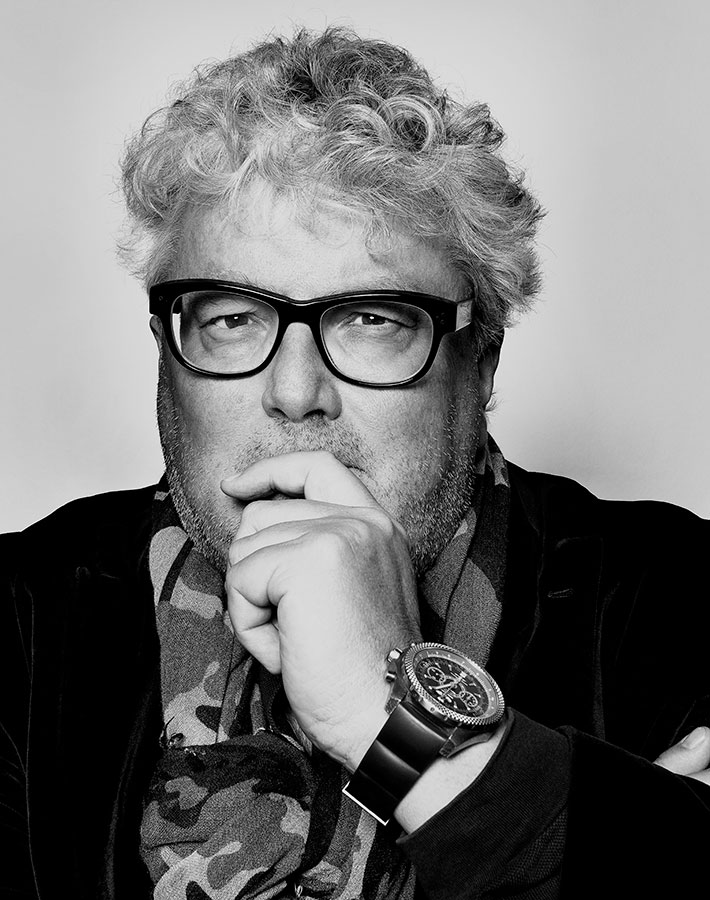
A Duderstadt
Cosmopolitan
Billionaire, middle-class German entrepreneurs are not normally unconventional, venturesome go-getters.
Except for one: Hans Georg Näder.
The “Capriccio” is an authentic Italian restaurant in the Grunewald, a posh borough deep in the western part of Berlin, miles away from the capital’s trendy hot spots. The patron welcomes each guest with a handshake. Many regulars come here, among of them quite a few TV stars. For Hans Georg Näder, the Capriccio is one of his living rooms when he is in Berlin. Always on the move around the globe, he owns several houses in places others can only dream of. Berlin, however, is his one true love, this “unfinished, rough and ready city”, as he calls it. At Potsdamer Platz, Näder’s company owns a stylish branch office complete with a showroom displaying its products: arm and leg prostheses, wheelchairs, orthotics — medica miracles in their own right. Otto Bock, his grandfather on his mother’s side, founded the company in 1919, his father Max Näder made it an international success, and Hans Georg Näder turned it into a global high-tech corporation: Otto Bock Health Care, the company’s slogan says, gives people their mobility back — in 140 countries.
The ability to enjoy life — and share that joy with others
In Germany, money is usually very discreet. Family businesses rule their empires from behind high walls, or at least behind high hedges. Hans Georg Näder, however, is anything but discreet.
Born in Duderstadt in the southern part of Lower Saxony, he a man of many facets, most of which hardly tally with the popular image of a backwater billionaire. For one thing, the ardent yachtsman is associated with a plethora of charity events great and small. The Ottobock Global Foundation looks after Syrian refugees in Turkey, supplying victims of the war with prostheses and wheelchairs, assists those afflicted by the earthquake in Nepal and supports children in Rio’s favelas. Näder has donated five million Euros for technical support of the Paralympics athletes, salvaged the National Anti-Doping Agency from bankruptcy, promoted deprived children in Prenzlauer Berg, presented his hometown with a new bell for its Catholic church, averted the demolition of its leading hotel, and put two million Euros into building a Tabaluga holiday resort for disabled or socially deprived children.
The “fun of giving”, as he calls it, is something he learned from his parents. “They were Protestants, very cosmopolitan, with a strong inclination towards humanism and laissez-faire.” In the 1980s, his father donated millions for a new organ to the small Protestant church in Duderstadt. His mother supported SOS children’s villages.
For a moment, Näder looks at his red wine glass. Hesitates. Then he says, “If you have the privilege to be born into such a family and such a world, then you should be prepared to share.” Näder’s good deeds are never planned. They somehow happen. Just as his parents’ benefactions, his are simply based on “fun and gut feeling”.
The German economic miracle made Duderstadt rich
Hans Georg Näder was born into the new prosperity of the early sixties. To date, he has converted his parents’ magnificent villa and park-like garden, and added a new building. The “Max Näder Haus” now serves as headquarters of the Näder Family Office including the company archives, and a venue for events. “A knowledge base and a meeting place, but not a museum”, says Näder.
For Näder, his company’s history is, as he puts it, “a driving force for the future”. And it also relates his own history. It was probably for his own good that his grades in math and physics were so “abysmal” that they more or less barred him from following in his father’s footsteps as an engineer. He enrolled in business economics instead, broke off when Max Näder’s health started to decline. At only 28, he took over the company on his father’s 75th birthday.
“I developed an approach which went beyond the visions of my grandfather as an orthopedic technician, and my father as an engineer. It’s about marketing, not about tiny screws. I think in shorter cycles, not in decades, and I have simply moved ahead challenge by challenge.”
Inventions fueled the company’s way to billion-Euro sales. According to Näder, many of the products it has developed would never have gone through in a large enterprise. “We have always remained a start-up of sorts.” He has founded or bought some 40 companies, then sold or closed down more than a few of them. He has taken great risks and produced flops, by and by developing the “gut instinct” many medium-sized companies rely on for success. “I’m like an angler sitting by the Alster, well away from the other anglers, with everyone else wondering why I’m sitting there, of all places. It’s because I have a feeling that this is where the fish are.”
He talks without the slightest whiff of management speak. And he avoids Anglicisms. Excel tables are an abomination to him, and he has never used a laptop. His qualities, he tells us, lie elsewhere: “I am rather good at dealing with people.”
For a creative company, a lot of movement is a good thing
Seven years ago, he bought the premises of a former brewery in Prenzlauer Berg. Not because he was looking for an investment, but because the bartender at the Soho House insisted on taking orders in English only. Näder left the bar. Strolling through the chilly full moon night in search of a gin tonic, he discovered a stretch of industrial wasteland and on it a construction site sign, partly overgrown with ivy. Once again, it was something that just happened, he says.
Näder bought the site, which covers a bit more than 24,000 square meters. He could have built a lot of apartments on it. Or at least a shopping mall. But he waived his building rights. Meaning he did what investorss in their right minds would simply never do.
So far, large chunks of the Bötzow brewery have been restored according to blueprints drawn by English star architect Sir David Chipperfield. By the end of this year, the Ottobock Group is going to move in with R&D, Marketing, and an IT team — all in all, some 200 people are going to work for Ottobock at Bötzow. Plus there will be restaurants and bars, a museum showing works from Näder’s notable art collection, a rehabilitation clinic for patients getting fitted with Ottobock technology after surgery, as well as spaces for start-up companies and a “Future Lab”.
Näder is about to pave the way for the fourth generation taking over — his daughters Julia and Georgia. “We will soon be so big that we will no longer be considered a family enterprise,” he says. Once Näder himself steps down, top managers are going to take over the day-to-day business, and they are likely to prefer Berlin to tiny Duderstadt. His daughters are going to take on seats on the group’s supervisory board.
With the company’s 100th anniversary just around the corner, Hans Georg Näder sees no reason to wax melancholic, for he intends to “shape the future”. And to do that, he sacrifices long-cherished traditions here and now. The famous gut instinct will soon be put out to grass.
Excerpts from the portrait of Alfred Weinzierl in “Spiegel Classic” (issue 01/2017).
Photo © Christoph Neumann
